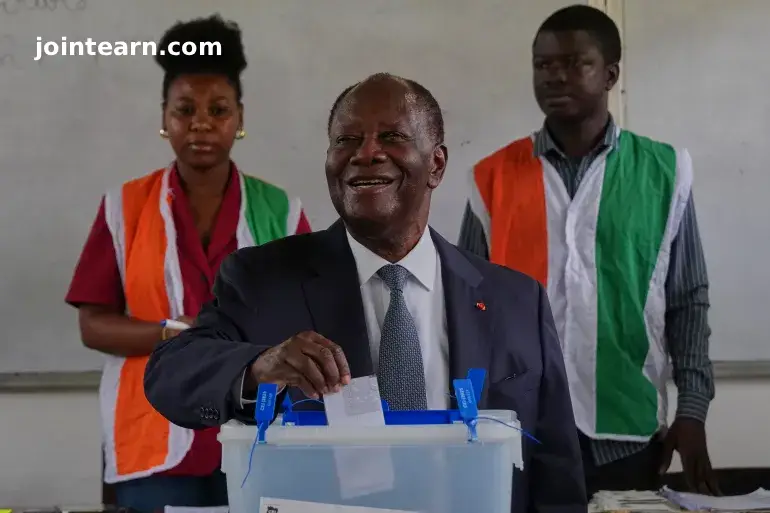
Abidjan, Ivory Coast — President Alassane Ouattara has been declared the winner of the Ivory Coast 2025 presidential election, securing a fourth consecutive term in office with a sweeping 89.77 percent of the vote, according to provisional results released by the Independent Electoral Commission (CEI) on Monday.
The 83-year-old incumbent, who has ruled since 2011, faced limited opposition after his two main political rivals — former President Laurent Gbagbo and ex–Credit Suisse CEO Tidjane Thiam — were barred from running due to legal and nationality issues.
A Controversial Victory Amid Low Turnout and Excluded Rivals
The October 25 election saw nearly nine million registered voters, but turnout was only around 50 percent, significantly lower than in the historic 2010 vote that brought Ouattara to power. The absence of strong challengers led to a landslide victory, but also renewed criticism of Ivory Coast’s democratic integrity.
Among the remaining candidates, former Commerce Minister Jean-Louis Billon received 3.09 percent, while former First Lady Simone Gbagbo secured 2.42 percent. Both conceded defeat shortly after results were announced.
Independent observers and journalists reported a peaceful voting process overall but noted widespread voter apathy, particularly among urban youth who expressed frustration over “a pre-determined outcome.”
“This is not necessarily an endorsement but a reflection of limited choices,” said Ahmed Idris, reporting from Abidjan. “The bans on key rivals and low voter engagement have raised questions about the credibility of this election.”
Opposition and Civil Society Question Legitimacy
Ouattara’s opponents accuse him of undermining democracy by controlling the political field and manipulating constitutional limits. Under the Ivorian constitution, presidents are restricted to two terms, but Ouattara claims his 2016 constitutional reform “reset” the count, allowing him to contest again.
Civil society groups condemned the decision, calling it a violation of the democratic spirit. In the weeks leading up to the vote, protests erupted across major cities, prompting the government to ban demonstrations and detain over 200 activists from opposition coalitions such as the Common Front.
“Ivory Coast is becoming an electoral autocracy,” said one rights activist based in Yamoussoukro. “We are seeing the institutionalisation of one-man rule.”
Economic Gains vs. Social Inequality
Ouattara, a former IMF economist and Central Bank official, has long touted his record of economic growth, infrastructure expansion, and political stability. Under his leadership, Ivory Coast — the world’s largest cocoa producer — has attracted significant foreign investment and maintained steady GDP growth.
However, critics say that economic inequality and corruption have deepened. While major cities like Abidjan have modernised rapidly, rural areas remain underdeveloped, with millions lacking access to quality education, healthcare, and employment.
“Many Ivorians feel the prosperity has not reached them,” said Idris. “High living costs and youth unemployment continue to fuel dissatisfaction.”
Ivory Coast’s public debt currently stands at around 60 percent of GDP, and analysts warn that without structural reforms, the country’s economic progress may falter.
Security Challenges and Regional Instability
Ouattara’s campaign heavily emphasized national security, positioning himself as the leader best equipped to counter Sahel-based militant threats. Armed groups such as Jama’at Nusrat al-Islam wal-Muslimin (JNIM) and the ISIL affiliate in the Greater Sahara (ISGS) have increasingly targeted border regions with Mali and Burkina Faso.
In response, the government has boosted its defense budget, increased troop deployments in the north, and procured new armored vehicles from China and other allies.
Despite these measures, terrorism and cross-border instability remain serious concerns.
Succession and Political Uncertainty
While Ouattara has pledged to “prepare a new generation of leaders,” there is currently no clear successor within the ruling Rally of Houphouëtists for Democracy and Peace (RHDP). Political analysts warn that the absence of an orderly transition plan could lead to instability similar to the 1993 succession crisis following the death of founding President Félix Houphouët-Boigny.
“If Ouattara fails to designate a credible successor, Ivory Coast risks another political vacuum,” warned Rinaldo Depagne of the International Crisis Group.
The Constitutional Council is expected to certify the election results within days, officially confirming Ouattara’s victory.


Leave a Reply